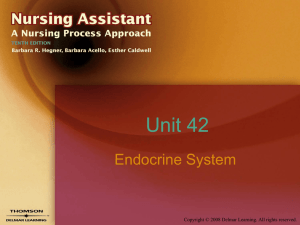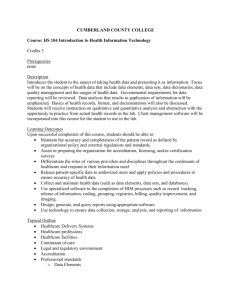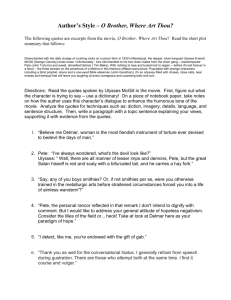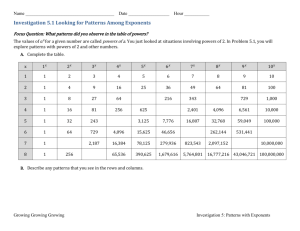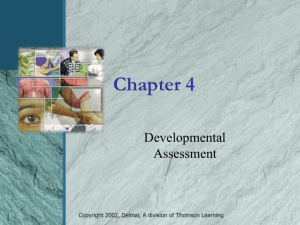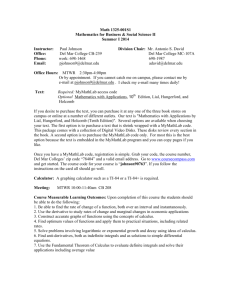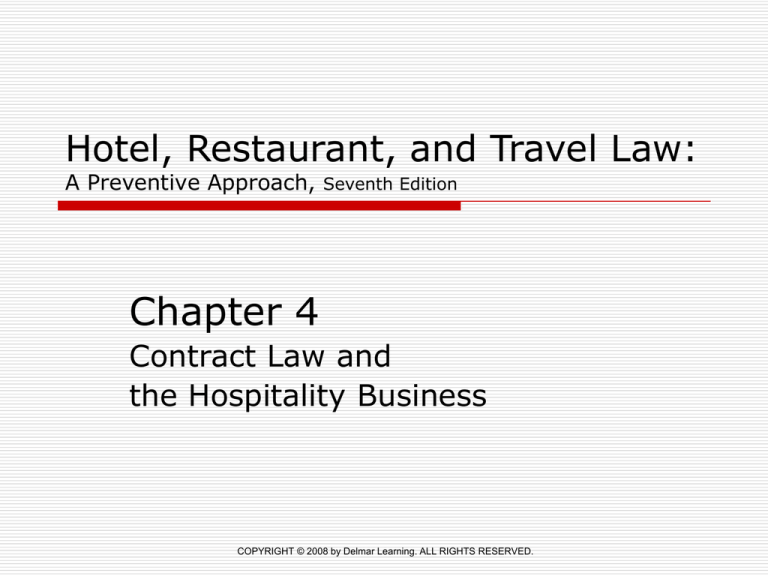
Hotel, Restaurant, and Travel Law:
A Preventive Approach,
Seventh Edition
Chapter 4
Contract Law and
the Hospitality Business
COPYRIGHT © 2008 by Delmar Learning. ALL RIGHTS RESERVED.
Introduction
A contract is an agreement between
two or more parties that is
enforceable in court
COPYRIGHT © 2008 by Delmar Learning. ALL RIGHTS RESERVED.
Elements of a Contract
Certain essential elements must exist
for the contract to be valid
Contractual capacity
Mutuality
Legality
Consideration
Proper form
Genuine assent
COPYRIGHT © 2008 by Delmar Learning. ALL RIGHTS RESERVED.
Capacity to Contract
The ability to both
Understand the terms of the contract
Appreciate that failure to perform its
terms can lead to legal liability
COPYRIGHT © 2008 by Delmar Learning. ALL RIGHTS RESERVED.
Capacity to Contract
(continued)
People who lack contractual capacity:
Viewed by the law as having diminished
mental abilities
Minors
(under 18, 19, or 21 depending on state)
Very intoxicated
Mentally incompetent
COPYRIGHT © 2008 by Delmar Learning. ALL RIGHTS RESERVED.
Voidable Contract
One that may be canceled at the
option of one party
Right to cancel, also called the right
to avoid or disaffirm
COPYRIGHT © 2008 by Delmar Learning. ALL RIGHTS RESERVED.
Mutuality
All parties to the contract are
interested in its terms and intend to
enter an agreement to which they will
be legally bound
COPYRIGHT © 2008 by Delmar Learning. ALL RIGHTS RESERVED.
Mutuality
(continued)
Offer—a proposal to do or give
something of value in exchange for
something else
COPYRIGHT © 2008 by Delmar Learning. ALL RIGHTS RESERVED.
Mutuality
(continued)
Offerer—the person who makes an
offer
Offeree—person to whom the offer is
made
COPYRIGHT © 2008 by Delmar Learning. ALL RIGHTS RESERVED.
Mutuality
(continued)
Offer must be definite
If terms are vague, contract may not
result
Invitation to negotiate—open
discussions that may or may not lead
to an offer
COPYRIGHT © 2008 by Delmar Learning. ALL RIGHTS RESERVED.
Responses to an Offer
Acceptance—an expression of
agreement by the offeree to the
terms of the offer
Counteroffer—the offeree is
interested in the offer but wants to
change a few terms
COPYRIGHT © 2008 by Delmar Learning. ALL RIGHTS RESERVED.
Legality
Terms of the contract must be legal
Void contract—one that is
unenforceable in court
COPYRIGHT © 2008 by Delmar Learning. ALL RIGHTS RESERVED.
Legality
(continued)
Price-fixing—competing hotels agree
among themselves to each charge the
same amount for a room
Antitrust laws—guarantee that
competitors will not undersell each
other with the effect of depriving
consumers of the benefits of
competition
COPYRIGHT © 2008 by Delmar Learning. ALL RIGHTS RESERVED.
Consideration
Something of value exchanged for
something else of value
Can take one of three forms:
A tangible item of value or a promise to give
such an item
Performance or a promise to perform
Forbearance—agreeing to refrain from doing
something you have a legal right to do
COPYRIGHT © 2008 by Delmar Learning. ALL RIGHTS RESERVED.
Illusory Contracts
The terms of the contract do not
contain a firm commitment
COPYRIGHT © 2008 by Delmar Learning. ALL RIGHTS RESERVED.
Proper Form
Is an oral contact enforceable?
General rule is yes; however, may be
difficult to prove
COPYRIGHT © 2008 by Delmar Learning. ALL RIGHTS RESERVED.
Statute of Frauds
Objective is to prevent the
perpetuation of a fraud by someone
claiming that a contract exists when
in fact none does
COPYRIGHT © 2008 by Delmar Learning. ALL RIGHTS RESERVED.
Statute of Frauds
(continued)
Some contracts must be in writing
Contracts for the purchase and sale of real
property
Contracts that cannot be completed within
one year from when they are made
Contracts to pay another person’s debt if
that person fails to pay
Contracts for the sale of goods
COPYRIGHT © 2008 by Delmar Learning. ALL RIGHTS RESERVED.
Parol Evidence Rule
Prevents the parties from modifying a
written contract using evidence of
oral agreements made prior to
signing the written contract
Does not apply to agreements made
after a contract is signed
COPYRIGHT © 2008 by Delmar Learning. ALL RIGHTS RESERVED.
Genuine Assent
The parties must genuinely agree to
the contract terms
Duress—threats of harm if they do
not sign
COPYRIGHT © 2008 by Delmar Learning. ALL RIGHTS RESERVED.
Genuine Assent
(continued)
Fraud—intentionally untruthful
statement made for the purpose of
misleading someone
Innocent misrepresentation—an
untruthful statement that the speaker
believes to be accurate
COPYRIGHT © 2008 by Delmar Learning. ALL RIGHTS RESERVED.
Mistakes
Some mistakes have legal
significance, others do not
Mistakes made by a buyer as to the
value or quality of a good being
purchased will not affect the validity
of the contract
COPYRIGHT © 2008 by Delmar Learning. ALL RIGHTS RESERVED.
Mistakes
(continued)
Unilateral mistake—error made by
only one party to the contract
Mutual mistake—error made by both
parties to the contract
COPYRIGHT © 2008 by Delmar Learning. ALL RIGHTS RESERVED.
Ambiguous Terms
Important to state terms of the
agreement clearly, without ambiguity
If terms are vague or confusing, it
could result in court disputing the
meaning
Careful drafting can avoid such
lawsuits
COPYRIGHT © 2008 by Delmar Learning. ALL RIGHTS RESERVED.
Trade Usage
Practices or modes of dealing
generally adhered to in a particular
industry, such that an expectation
arises that they will be honored in a
given transaction
COPYRIGHT © 2008 by Delmar Learning. ALL RIGHTS RESERVED.
Conditions
Absolute—in most contracts,
promises of the parties to perform
their contractual obligations
Contingent—relies on the occurrence
or nonoccurrence of a specified event
COPYRIGHT © 2008 by Delmar Learning. ALL RIGHTS RESERVED.
Contracts Formed on the Internet
Virtually every type of commercial
deal can be, and is, pursued via the
Internet
How valid are these contracts entered
in cyberspace?
As a general rule, as enforceable as their
“land-based” counterparts
COPYRIGHT © 2008 by Delmar Learning. ALL RIGHTS RESERVED.
Contracts Formed
on the Internet
(continued)
“Click-on acceptance”—generally
considered to be signed consent
COPYRIGHT © 2008 by Delmar Learning. ALL RIGHTS RESERVED.
Breach of Contract
Failure to perform as required by a
contract
Civil wrong
COPYRIGHT © 2008 by Delmar Learning. ALL RIGHTS RESERVED.
Breach of Contract
(continued)
Nonbreaching party may be entitled
to a remedy
Damages—money to compensate for
resulting loss
Specific performance—performance of
the contract terms
COPYRIGHT © 2008 by Delmar Learning. ALL RIGHTS RESERVED.
Compensatory Damages
Sum of money necessary to cover
loss incurred by the nonbreaching
party as a result of the breach
Nonbreaching party generally not
entitled to damages for pain and
suffering
COPYRIGHT © 2008 by Delmar Learning. ALL RIGHTS RESERVED.
Requirement of Foreseeability
A plaintiff seeking to collect damages
for breach of contract must prove
that the damages were foreseeable to
the breaching party
COPYRIGHT © 2008 by Delmar Learning. ALL RIGHTS RESERVED.
Requirement of Reasonable
Certainty
Plaintiff in a breach-of-contract case
must prove to a reasonable certainty
that they suffered a loss as a result of
the breach
COPYRIGHT © 2008 by Delmar Learning. ALL RIGHTS RESERVED.
Duty to Mitigate
Plaintiff seeking to collect damages
for breach of contract must prove
that it attempted to mitigate its loss
Mitigate—reduce or lessen
COPYRIGHT © 2008 by Delmar Learning. ALL RIGHTS RESERVED.
Punitive Damages
Sum of money sometimes awarded to
a plaintiff
In excess of compensatory damages
Meant to punish the defendant for
wanton or malicious behavior
COPYRIGHT © 2008 by Delmar Learning. ALL RIGHTS RESERVED.
Specific Performance
A court order requiring the defendant
to perform the act promised in the
contract
Applicable only to contracts involving
the sale of unique, one-of-a-kind
items
COPYRIGHT © 2008 by Delmar Learning. ALL RIGHTS RESERVED.
Contracting for a Room
Contract for a room between
innkeeper and guest must satisfy the
essential elements
Most contracts for hotel rooms begin
with an invitation to negotiate from a
would-be guest
COPYRIGHT © 2008 by Delmar Learning. ALL RIGHTS RESERVED.
Contracting for a Room
(continued)
Offer is then often made by the hotel or
guest
Agreement should be put in writing to avoid
misunderstandings as to:
Dates
Duration of stay
Applicable rate
Special needs of the guest
COPYRIGHT © 2008 by Delmar Learning. ALL RIGHTS RESERVED.
Overbooking and Breach of
Reservation Contract
A hotel reservation, once made and
confirmed, constitutes a contract
Binds hotel to provide
accommodations
COPYRIGHT © 2008 by Delmar Learning. ALL RIGHTS RESERVED.
Overbooking and Breach of
Reservation Contract
(continued)
Hotels sometimes overbook (confirm
more reservations than the number of rooms)
For those guests the hotel cannot
house, it will be in breach of contract
and liable for damages
COPYRIGHT © 2008 by Delmar Learning. ALL RIGHTS RESERVED.
Damage to Goodwill
Goodwill—favorable reputation
producing an expectation of future
business
COPYRIGHT © 2008 by Delmar Learning. ALL RIGHTS RESERVED.
Agreement Not to Compete
Provision barring the seller from
competing in the same geographical
area for a specified period of time
COPYRIGHT © 2008 by Delmar Learning. ALL RIGHTS RESERVED.
Breach by a Guest
When a guest cancels a reservation
COPYRIGHT © 2008 by Delmar Learning. ALL RIGHTS RESERVED.
Cancellation Clause for Organization
Reserving a Large Block of Rooms
An association may reserve many
rooms (sometimes 100s or even 1000s) for
a conference
Many contracts have a cancellation
provision that identifies the
obligations of each party in the event
of termination of the contract
COPYRIGHT © 2008 by Delmar Learning. ALL RIGHTS RESERVED.
Attrition Clause
Contract provision that obligates the
organization to compensate the hotel
if less than the contractual number of
rooms (block) are rented by
conventioneers
COPYRIGHT © 2008 by Delmar Learning. ALL RIGHTS RESERVED.
No-Cause Termination Clause
Contract provision permitting either
party to terminate the contract for
any reason or for no reason at all
COPYRIGHT © 2008 by Delmar Learning. ALL RIGHTS RESERVED.
Forum Selection Clause
Allows the parties to agree that any
litigation resulting from the contract
will be initiated in a specific forum
COPYRIGHT © 2008 by Delmar Learning. ALL RIGHTS RESERVED.
Forum Selection Clause
(continued)
Three types of forums
Reference might be to a particular court in a
jurisdiction agreed upon by the parties
Might refer to a specific kind of dispute
resolution process (mediation, arbitration, hearing
before a special referee)
Might refer to both, requiring a specific
process to be carried out in a specific
location
COPYRIGHT © 2008 by Delmar Learning. ALL RIGHTS RESERVED.
Intentional Interference with
Contractual Relations
Tort—noncriminal conduct done by
one person that causes injury or
financial loss to another
COPYRIGHT © 2008 by Delmar Learning. ALL RIGHTS RESERVED.
Intentional Interference with
Contractual Relations (continued)
To commit the tort of intentional interference
with contractual relations, three elements are
necessary:
A valid contract must exist between two parties
A third party must be aware of the existence of
the contract
Third party must intentionally cause or induce
one of the contracting parties to break the
contract and do business instead with the third
party
COPYRIGHT © 2008 by Delmar Learning. ALL RIGHTS RESERVED.
Catering Contracts
Contract with caterer or restaurant
for food
No excuse for not having a written
contract
Refer to Figure 4-1 in the textbook for
items that should be included in the
contract
COPYRIGHT © 2008 by Delmar Learning. ALL RIGHTS RESERVED.
Convention Contract
Contract between an organization
planning a convention and the hotel
at which the conference will be held
Refer to Figure 4-2 in the textbook for
items that should be included in the
contract
COPYRIGHT © 2008 by Delmar Learning. ALL RIGHTS RESERVED.



